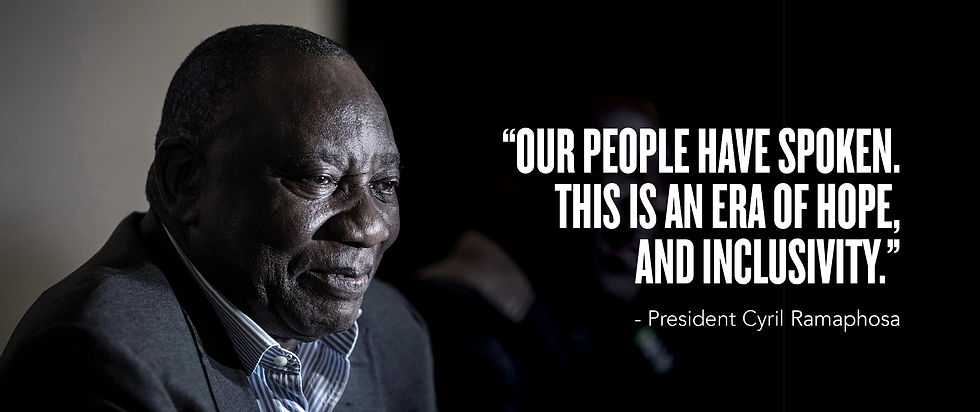
By Natalie Maroun
Managing Director
South Africans witnessed a miracle today.
The swearing in of President Cyril Ramaphosa, and the imminent birth of a new government of national unity, have been nothing short of miraculous.
Who could have imagined, just three months ago, that we would be here today? A little battered. A little bruised, for sure. But hopeful. And brimming with optimism, because we get a second chance at writing a new South African story.
Miraculous. Because if history has taught us anything at all, it is that human beings love to be in charge. And we hate to relinquish it, or have it taken from us.
To seek and maintain dominion over people, in order to profit from their resources, is the single most dominant driver of recorded human history.
From the ancient kingdoms of Africa and Asia, to the empires that rose and fell in Europe and the Americas, the story of humanity is the story of conquest and dominion. And the story of tragedy and devastation that inevitably follow when the conqueror becomes the conquered.
This is the story of our history. But it is hardly ancient history.
Around the world, the three horsemen of fascism, nationalism and totalitarianism are galloping apace. Turns out, the only thing we love more than being in charge is being in total charge.
We’ve seen it in the United States – supposedly a bastion of democracy – where Donald Trump's refusal to accept the 2020 election results led to the violent storming of the US Capitol, resulting in the deaths of five people, and injuring over 140 others, including 81 Capitol police officers.
We've seen it in Turkey, where Recep Tayyip Erdoğan, the self-styled ‘guardian of the common people’, has centralised power while simultaneously purging the judiciary and military and cracking down on the media and academia.
We’ve seen it in Brazil, where Jair Bolsonaro, positioning himself as an anti-corruption champion and defender of traditional values, have strong-armed extremist policies that have exacerbated divisions within Brazilian society.
And we’ve seen it in Russia, where Vladimir Putin has maintained power for over two decades by systematically dismantling opposition, controlling the media, and manipulating electoral processes to cement his authoritarian regime under the guise of national stability and resurgence.
Closer to home, no fewer than five African nations – Burkina Faso, Chad, Guinea, Sudan and Mali – have all seen military coups in just the last five years. Of these, none have returned to democratic rule. The politics and the personalities vary, but the root cause is the same: An insatiable hunger for power, and a bloody determination to hang on to it – no matter the cost.
Because power is a silent assassin.
It lures with the beguiling language of service, selflessness, and the greater public good. It flatters and seduces under the cloak of virtue and altruism. And it routinely wraps itself in the flag of nationalism.
Soon, it has established itself not only as the better way, but the only way.
But power is, by its very nature, voracious. It is never satisfied.
Slowly, imperceptibly, it begins to flex muscles of ego and ambition, and almost always at the expense of humility and empathy. Greater good takes on a darker meaning. Righteousness becomes relative. And before you realise it, power has become both the means, and the end.
This could so easily have been us.

For years, the sceptre of national collapse hung over South Africa like a doomsday premonition. “Another Zimbabwe” became the dog whistle of white flight, and “pro poor” the rallying cry of the extreme left, as critics and supporters alike noted one dismal state failure after another:
Our failure to hold the looters and the grifters to account.
Our failure keep the lights on, and our infrastructure from collapsing.
Our failure to stem the rot of crime or gender-based violence.
Our failure to feed, educate or care for the most vulnerable in our community.
State collapse could so easily have been us. All the actors and the ingredients were in place. The table was set. In KwaZulu Natal, and the many other hotbeds of dissent and disaffection, the story was already being written.
Friday, 14 June changed the story. And it’s given us a unique, unprecedented opportunity to rewrite it completely.
We may never know just how close we came to the precipice of collapse. But all of us know, instinctively, that South Africa would have been fatally fractured by four more years of impotent infighting and petty party politics.
Our country would not have survived it.
But on Friday, the people we chose to represent us – people who have so often proven unequal to the task – got it right.
In a breathtaking week of courage, humility, sacrifice and statesmanship, they chose to do something so few others around the world have been able to do: They turned a deaf ear to the beguiling whispers of power, to do what is truly in the national interest.
Exhale, South Africa. Our leaders – bar a few silent assassins of democracy – have done their bit.
The centre held. Common sense prevailed. The guardrails of democracy remained intact. And South Africa's leaders remembered who they are, and who they serve.
Now it’s up to us.
Exhale, South Africa.
Then take a deep breath. We have work to do.
© The Performance Agency